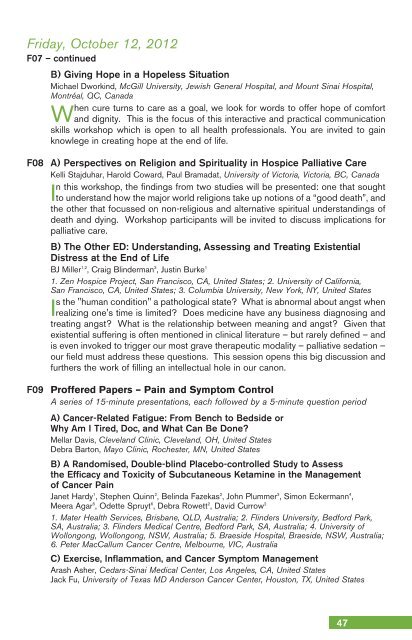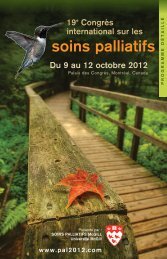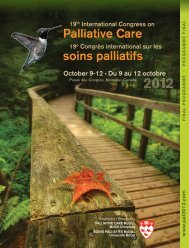Friday, October 12, 2012F05 – continuedB) Brush Up on the Basics: Mouth <strong>Care</strong> at the End of LifeTeri Crockford 1,2 , Karen Kiely 21. McMaster University Medical Center, Hamilton, ON, Canada2. Dr. Bob Kemp Centre for Hospice <strong>Palliative</strong> <strong>Care</strong>, Hamilton, ON, CanadaIf your eyes are the windows of your soul, your mouth can be considered thegateway to underlying health, social issues and inadequacies in patient care.Through a unique inter-disciplinary approach, the obstac<strong>les</strong>, perceived and real,in performing mouth care at the end of life will be explored. The common toolswill be identified, as well as a “hands on” approach in assessing and performingmouth care.F06 Workshop/Proffered Papers – Education and Community <strong>Care</strong>A 45-minute workshop, and two 15-minute presentations, each followedby a 5-minute question period.A) Exploring an Asset-based Approach to Community EngagementAround End-of-Life Conversations and <strong>Care</strong>Mary Matthiesen 1 , John Ashton 2 , Elaine Owen 3 , Katherine Froggart 4 , John McKnight 51. The Conversations for Life Programme and Stories to Change, CIC, Cumbria,United Kingdom; 2. NHS Cumbria Primary <strong>Care</strong> Trust, Cumbria, United Kingdom;3. NHS Merseyside and Cheshire <strong>Palliative</strong> and End of Life <strong>Care</strong> Network, Cheshire,United Kingdom; 4. International Observatory on End of Life <strong>Care</strong>, Lancaster University,Lancaster, United Kingdom; 5. Asset-Based Community Development Institute,Northwestern University, Evanston, IL, United StatesWhat’s possible for partnership-led community awareness initiatives? In thisinteractive session, participants will experience key elements of projectslaunched in 7 disparate communities (UK), identify the 5 key action items independentlyidentified by each, and apply an ‘asset-based’ template to consider how to furtherdevelop initiatives in their own country/community.B) Integration of <strong>Palliative</strong> <strong>Care</strong> Education within Oncology Usingthe EPEC-O Canada ProgramLouise Hanvey 1 , Paul Daeninck 2 , Larry Librach 3 , Irene Nicoll 1 , Judy Simpson 11. Canadian Partnership Against Cancer, Toronto, ON, Canada; 2. University ofManitoba, Winnipeg, MB, Canada; 3. University of Toronto, Toronto, ON, CanadaC) Development of a Province Wide Structured Program to EnhanceCapacity for <strong>Palliative</strong> <strong>Care</strong> in General PracticeDouglas McGregor 1 , Doris Barwich 2 , Cathy Clelland 31. Vancouver Coastal Health, Vancouver, BC, Canada; 2. Fraser Health, Surrey, BC,Canada; 3. Society of General Practitioners, BCMA, Vancouver, BC, CanadaF07 A) Dangling the Carrot: The Ethical Dilemma ofOffering Ineffective Medical TreatmentDominic Glorioso 1,2 , Ellen Metzger 11. York Hospital, York, PA, United States2. Gettysburg Hospital, Gettysburg, PA, United StatesWhy do physicians continue to offer treatments to dying patients that theyknow will be ineffective? How can we communicate "realistic hope" to ourpatients and their families? Have we encouraged patient autonomy to the pointthat we are unintentionally harming our patients? These ethical challenges will beaddressed through case studies and dialogue.46
Friday, October 12, 2012F07 – continuedB) Giving Hope in a Hope<strong>les</strong>s SituationMichael Dworkind, McGill University, Jewish General Hospital, and Mount Sinai Hospital,Montréal, QC, CanadaWhen cure turns to care as a goal, we look for words to offer hope of comfortand dignity. This is the focus of this interactive and practical communicationskills workshop which is open to all health professionals. You are invited to gainknowlege in creating hope at the end of life.F08 A) Perspectives on Religion and Spirituality in Hospice <strong>Palliative</strong> <strong>Care</strong>Kelli Stajduhar, Harold Coward, Paul Bramadat, University of Victoria, Victoria, BC, CanadaIn this workshop, the findings from two studies will be presented: one that soughtto understand how the major world religions take up notions of a “good death”, andthe other that focussed on non-religious and alternative spiritual understandings ofdeath and dying. Workshop participants will be invited to discuss implications forpalliative care.B) The Other ED: Understanding, Assessing and Treating ExistentialDistress at the End of LifeBJ Miller 1,2 , Craig Blinderman 3 , Justin Burke 11. Zen Hospice Project, San Francisco, CA, United States; 2. University of California,San Francisco, CA, United States; 3. Columbia University, New York, NY, United StatesIs the "human condition" a pathological state? What is abnormal about angst whenrealizing one's time is limited? Does medicine have any business diagnosing andtreating angst? What is the relationship between meaning and angst? Given thatexistential suffering is often mentioned in clinical literature – but rarely defined – andis even invoked to trigger our most grave therapeutic modality – palliative sedation –our field must address these questions. This session opens this big discussion andfurthers the work of filling an intellectual hole in our canon.F09 Proffered Papers – Pain and Symptom ControlA series of 15-minute presentations, each followed by a 5-minute question periodA) Cancer-Related Fatigue: From Bench to Bedside orWhy Am I Tired, Doc, and What Can Be Done?Mellar Davis, Cleveland Clinic, Cleveland, OH, United StatesDebra Barton, Mayo Clinic, Rochester, MN, United StatesB) A Randomised, Double-blind Placebo-controlled Study to Assessthe Efficacy and Toxicity of Subcutaneous Ketamine in the Managementof Cancer PainJanet Hardy 1 , Stephen Quinn 2 , Belinda Fazekas 2 , John Plummer 3 , Simon Eckermann 4 ,Meera Agar 5 , Odette Spruyt 6 , Debra Rowett 2 , David Currow 21. Mater Health Services, Brisbane, QLD, Australia; 2. Flinders University, Bedford Park,SA, Australia; 3. Flinders Medical Centre, Bedford Park, SA, Australia; 4. University ofWollongong, Wollongong, NSW, Australia; 5. Braeside Hospital, Braeside, NSW, Australia;6. Peter MacCallum Cancer Centre, Melbourne, VIC, AustraliaC) Exercise, Inflammation, and Cancer Symptom ManagementArash Asher, Cedars-Sinai Medical Center, Los Ange<strong>les</strong>, CA, United StatesJack Fu, University of Texas MD Anderson Cancer Center, Houston, TX, United States47
- Page 1 and 2: 19 th InternationalCongress onPalli
- Page 3 and 4: Congress Planning CommitteesExecuti
- Page 5 and 6: AcknowledgementsThe 19 th Internati
- Page 7 and 8: Student SectionAn opportunity for b
- Page 9 and 10: Scientific ProgrammeBe sure to visi
- Page 11 and 12: Tuesday, October 9, 2012S1 - contin
- Page 13 and 14: Wednesday, October 10, 201207:45 -
- Page 15 and 16: Wednesday, October 10, 2012B1 - con
- Page 17 and 18: Wednesday, October 10, 201214:00 -
- Page 19 and 20: Wednesday, October 10, 2012A7 - con
- Page 21 and 22: Wednesday, October 10, 2012A12 - co
- Page 23 and 24: Wednesday, October 10, 2012B05 - co
- Page 25 and 26: Wednesday, October 10, 2012B10 Prof
- Page 27 and 28: Wednesday, October 10, 2012B14 - co
- Page 29 and 30: Wednesday, October 10, 2012C08 Work
- Page 31 and 32: Wednesday, October 10, 2012C12 Prof
- Page 33 and 34: Thursday, October 11, 2012PL2 - con
- Page 35 and 36: Thursday, October 11, 2012D06 - con
- Page 37 and 38: Thursday, October 11, 2012D11 - con
- Page 39 and 40: Thursday, October 11, 2012E02 A) Le
- Page 41 and 42: Thursday, October 11, 2012E09 A) Th
- Page 43 and 44: Thursday, October 11, 2012B) Décis
- Page 45: Friday, October 12, 2012F03 St. Chr
- Page 49 and 50: Friday, October 12, 2012F12 Proffer
- Page 51 and 52: Friday, October 12, 2012G05 - conti
- Page 53 and 54: Friday, October 12, 2012G11 Proffer
- Page 55 and 56: Place Jacques-CartierMontréalA CIT
- Page 57 and 58: Registration InformationRegistratio
- Page 59 and 60: Where to StayAll hotels listed are
- Page 61 and 62: WednesdayOctober 10 - cont’dThurs
- Page 63 and 64: NameSession CodeKeats, Kerry ......




